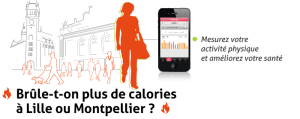Since June 2013, IDS Santé has been studying a panel of 1,000 people with a smart pedometer for 6 months. Progress report.
Lille, Bordeaux, Lyon and Montpellier hosted, in early June 2013, a study called “My mobile health”. Four months have passed. IDS Santé delivers first impressions.
Lille has been in the lead since the start of the operation with an average of 8,570 steps daily. Lyon is second with 8053 steps. Then Montpellier, 7,665 steps, and Bordeaux, 7,085 steps.
My mobile health study does not yet explain the hierarchy maintained for 4 months. She simply notes that the cities with the most unemployed volunteers and the least managers are Bordeaux and Montpellier. Another, perhaps, explanation is that physical activity differs depending on the city: cycling is practiced in Bordeaux (19%) and Montpellier (26%), while Lyon (15%) and Lille (12%) walk and hike. So let's be patient for the analyzes and conclusions.
- Women are walkers!
According to pedometers, women are the best walkers in 3 affected cities. They are between 36 and 45 years old, are mothers in Lyon and Montpellier, and practice hiking or jogging. Bordelaises, Lyonnaises and Montpelliéraines perform between 15,000 and 21,300 strides daily. But the title goes to a Lille native, father and member of the 36-45 age group, with 24,000 daily steps and 1,750 km traveled since the start of the operation!
Question: Does having a pedometer motivate people to walk? The answer is ignored, but according to the figures, observing the curves casts doubt on the influence of smart health connected objects on behavior.
However, we observe that the average number of steps is highest at the start of the study. Pedometers display more than 8,000 steps and almost 9,000 in Lille. It then drops. Agathe Quignot, Director General of IDS Health, sees this enthusiasm in the effect that volunteers receive the pedometer.

[ad_2]








